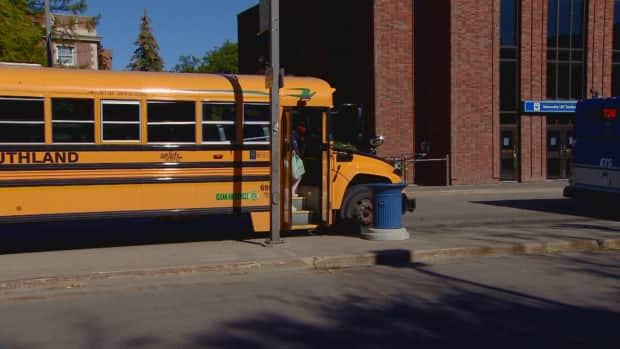As food bank use grows on university campuses, 'care cupboards' are now popping up

When Tilova Tul arrived at the University of Alberta from Bangladesh last year as a graduate student, she quickly turned to the campus food bank for help.
"I moved here with just two luggages, leaving everything back home," she said.
"It was winter and everything was so expensive."
Tul, who is studying public health, started using the school's food hamper program every few weeks, which provided her with staples such as eggs and rice.
Her husband and three-year-old son have now joined her, meaning there are more mouths to feed. Combine that with inflation and higher living expenses, and money can be tight. Food hampers help fill the gap.
"That makes the grocery costs a little lighter so everything accumulated, that kinda helps," Tul said, who is also a volunteer with the food bank.
Amid an affordability crisis in Canada, Statistics Canada released new numbers last week showing Canadians are paying nearly 10 per cent more for groceries in August than they were the previous year. And as of fall 2020, nearly one in 10 Canadians said they had experienced food insecurity in their homes in the past 12 months.
Increasing demand
Campus food banks in several provinces say demand is soaring.
Erin O'Neil, executive director of the campus food bank at the University of Alberta, said several hundred new clients have signed on with the program since the start of the school year.
"We're giving out as many hampers per week as we were giving out per month in the 2019-2010 school year," she said.
"Right now, we're giving out close to 180 hampers per week."

The food bank's clients cite grocery costs and rising tuition as the two main reasons they need help, O'Neil said.
Across the country, Sue Kidd, the chaplaincy minister at the University of Prince Edward Island, said students' needs are also growing. Kidd said the school's food bank recently saw more than 100 students use its services — the most ever.
During the peak of the COVID-19 pandemic, the food bank saw between 80 and 90 students a day, compared with 25 to 30 beforehand, she said.
"September is often busy — tuition, books, setting up where it is they're living," Kidd said.
"In the past they might have reached out to family and friends for help but everybody is feeling the pinch." - Sister Sue Kidd, University of Prince Edward Island
"In the past they might have reached out to family and friends for help but everybody is feeling the pinch."
At Mount Royal University in Calgary, a program that allows students to buy fresh fruits and vegetables at an affordable cost saw 41 people request boxes — a record high, according to Lisa Antichow, support services manager for the Mount Royal University Students' Association.
Antichow attributes the high demand to inflation as well as the higher cost of tuition, rent and food.
New campus initiatives to address the need
The university recently installed five "care cupboards" at several locations on campus.
The custom-made units, which students can access for free, include a fridge, microwave and cupboard, and they are filled with items such as fresh fruit, yogurt, cheese and granola bars. They also carry hygiene and sanitation items.

Antichow said the care cupboards have been in high demand.
"We restock them twice a week. Every time we go back to restock them, they're empty," she said.
"They're very popular."
Antichow cited a recent survey done by university faculty that revealed approximately 10 per cent of students were food insecure, and that 75 per cent of that group reported being severely affected, such as skipping meals because they could not afford to eat.
The care cupboards came about as a result. Antichow said the timing has worked out well, considering the affordability crisis.
"I don't think it could have come at a better time to be honest with you," she said.
"It's allowing students to save a little bit of money at the grocery store by being able to come to our care cupboards and grab a quick bite to eat, a quick snack."

Back at the University of Alberta in Edmonton, the demand for other initiatives to address food insecurity is growing. The campus food bank recently expanded its free weekly breakfast program to a second campus, and its grocery bus service, which leaves from the city's main campus, is also in demand.
"We have a grocery bus that takes students from this area, which has some of the most expensive grocery stores in the city to further down where there are cheaper and more varied grocery stores," said O'Neil.
"We're doubling that service this year as well and have seen increased demand that's leading to that doubling."


